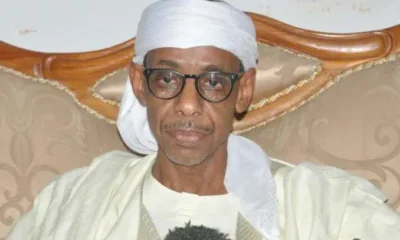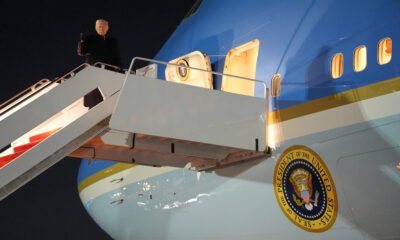Business
NAMA hikes airline navigation service charges by 800%
The Nigerian Airspace Management Agency (NAMA) has announced plans to increase the unit rate/minimum charge for en-route air navigation services from N2,000 to N18,000.
Umar Farouk, managing director (MD) of NAMA, spoke on Friday at the League of Airports and Aviation correspondents seminar in Lagos.
The event was themed ‘Aviation Survivability amidst a Challenging Macro-Economic Environment’.
Farouk said the unit rate/minimum charge for terminal navigation charge (TCN domestic) would also be raised from N6,000 to N54,000 per flight.
The MD said the agency also plans to increase the extension of service hours to airlines from N50,000 to N450,000, representing an 800 percent increase per extension to enable the agency to recover the cost of diesel and other logistics during the extension period.
He said the new charges would take effect from September 1.
“The Nigerian Airspace Management Agency relies on statutory fees for the management of the airspace (remember that aviation takes place only in the air),” Farouk said.
“These funds are generated from services we provide to the flying community. Without these funds, NAMA can’t discharge its responsibility of ensuring the safety of our airspace effectively.
“We mainly generate these funds through the airline companies.”
Speaking further, Farouk said in 2023, NAMA had an expenditure of about N21 billion in personnel costs alone, over N12 billion in capital costs, and over N10 billion in overhead costs, adding that all these were to be funded without the federal government budgetary allocation.
He also said NAMA had been charging as low as N11,000 per flight when a one-way domestic ticket cost only N16,000.
The MD added that the agency’s navigational charges had remained the same since June 2008, despite the hike in ticket prices which has gone as high as between N150,000 to N200,000 for a one-way economy ticket owing to the prevailing economic circumstances.
“Currently, our unit rate for international flights charged for service provision is about $70, and domestic flights are charged N6,000,” Farouk said.
“While NAMA recognises the difficult economic environment in which aviation operates in Nigeria, it is equally a part of the ecosystem.
“It goes to the same market to procure equipment and other services like training. If NAMA is to survive and continue to guarantee safety and efficiency in the airspace, it must breathe.
“Even though most costs in the economy have increased by more than 1,000 percent, NAMA has proposed to increase its fees by 800%.
“The new rates for en-route and terminal navigation charges are to be reviewed from N2,000 and N6,000 to N18,000 and N54,000 per flight.
“Also, the extension of service hours is to be reviewed from N50,000 to N450,000 per extension to enable the agency to recover the cost of diesel and other logistics during the period of extension.”
“The largest percentage of NAMA’s revenue comes from en-route navigation charges (domestic and international flights) and terminal navigation charges (domestic and international flights).”
Farouk also said while international flights pay in dollars, domestic flights pay in the Nigerian currency.





















